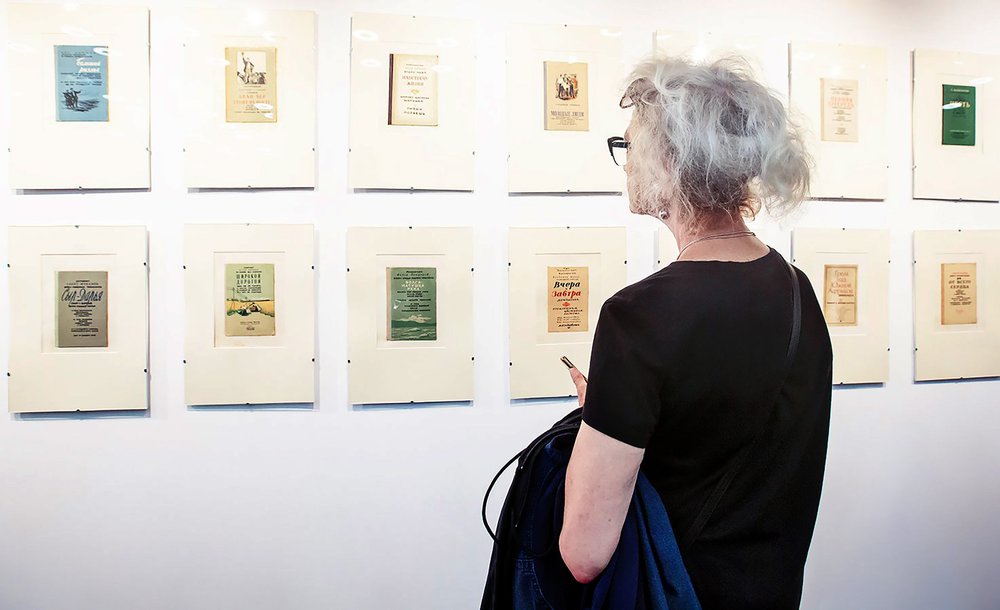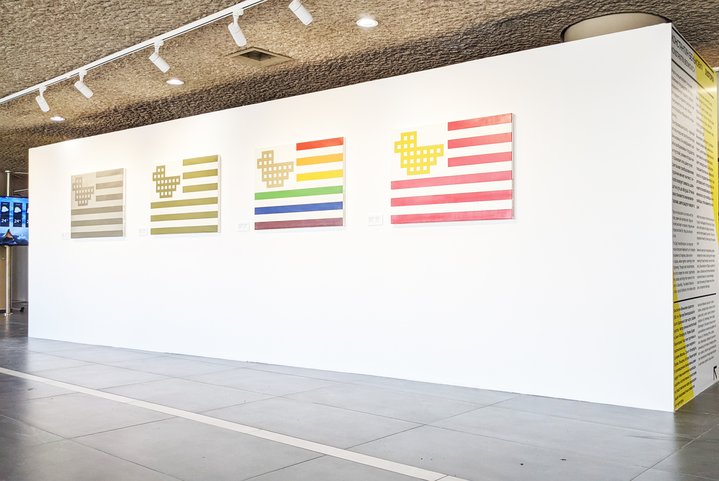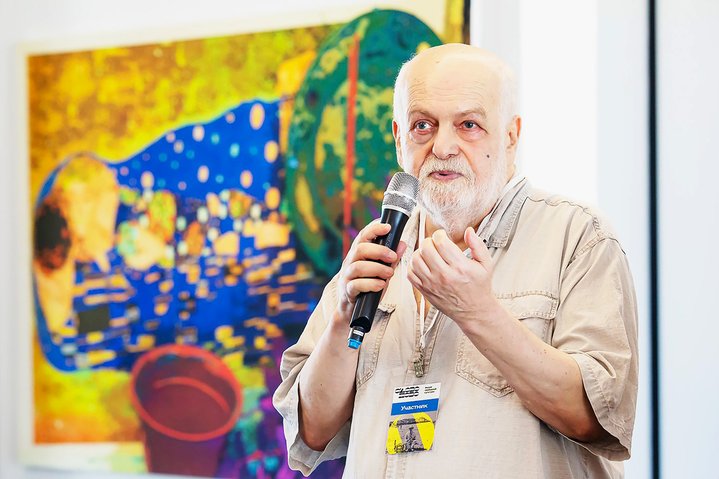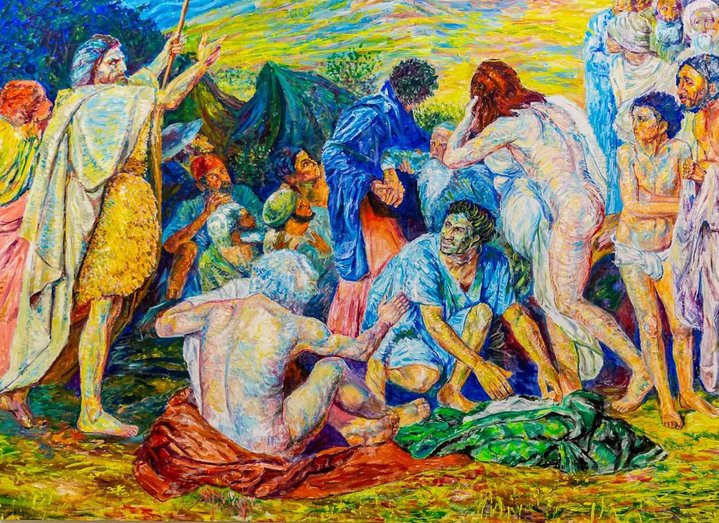Showcase of Russian émigré art in Tel Aviv

Mikhail Grobman's exhibition "Covers, Visual Poems." Photo Yael Ilyinskaya. Courtesy Slovonovo
A forum dedicated to independent culture called Slovonovo has been held in Israel for the first time. Russian poet Ivan Kvasov who recently moved to Tel Aviv shares his impressions.
Slovonovo means “The New Word” in English. Created in 2018 by Russian art dealer and curator Marat Guelman (declared a 'foreign agent' by the Russian authorities), until now it has been held in Montenegro. But the Tel Aviv experience this Spring has proved successful and gave the forum a new dimension.
Since February 24th, Russian culture at home and particularly abroad has found itself in a difficult situation. Do we have the moral right to speak out? What words can we use to talk about what is happening? How to create art or poetry in this situation? Will we be understood? The phrase ‘cancellation of Russian culture’ has been drifting around social networks. There are echoes of the debates about German culture after World War II, which culminated in the words of Theodor W. Adorno: “To write poetry after Auschwitz is barbaric”. And every performance, concert, or exhibition at Slovonovo addressed these questions in one way or another. In the new reality that faces us today, we need a new language. The Forum acted as a kind of sieve in which works created some time ago, in some cases long ago, were subjected to a test of relevance. Some works remained unchanged, others acquired a new meaning, while others became irrelevant.
Mikhail Grobman’s (b. 1943) ‘Covers, Visual Poems’ was a particularly funny, and at the same time profound exhibition. In 1980, when Soviet power seemed eternal, Grobman took the book covers of some unknown, second-rate Soviet writers and wrote poetry directly onto them, integrating the surname and title of the novel into his poem. The poems were deliberately lapidary and very obscene. Grobman played the role of an eight-year-old hooligan who snuck into the school library. The jokes are deliberately flat. What could he write that would be more offensive? What would make the librarian angry? But all this lapidary simplicity deflates the Soviet morass. The regime did its best to puff up cheeks and try to be serious. The regime's logic was that bloody crimes do not compromise one’s reputation, the main thing was not to be ridiculous. Because to be ridiculous meant to be pathetic, and it’s somehow stupid to be afraid of anyone or anything pathetic. And all the huge and formidable Soviet power in the works of Mikhail Grobman becomes a worthless, stupid, pompous fool. There is no fear; only a shell is left. Soon it will crumble. The exhibition turned out to be unexpectedly topical.
Sots-art classic Alexander Melamid (b. 1945) continued the recycling of culture in his ‘Back to Future’ project. The concept of the exhibition can be described as follows: how would Van Gogh have painted iconic classical Russian and Soviet pictures? Most of the works are immediately recognizable, many of the prototypes adorned the last pages of Soviet school textbooks. It is pleasing, however, that along with Russian realist painters Ivan Shishkin (1832-1898) and Vassily Perov (1833-1882), Alexander has copied his own painting ‘The Birth of Socialist Realism’, (co-authored with Vitaly Komar) where a Muse whispers something to Stalin. With this elegant gesture, Melamid places himself right among the classics. And on the other hand, he shows that he can recycle cultural material forever. After all, his and Komar’s work was itself a reworking of Socialist Realist art, that is, it is obviously a secondary work. And here it is again, the reworking of an old coat.
‘The New World’, an exhibition of the acclaimed Moscow-born, Tel Aviv-based artist Semyon Faibisovich (b. 1949) was both fortunate and unfortunate at the same time. His large-scale canvases hung in the hallway leading to the hall, where readings and discussions were taking place. People hurried past the paintings from one performance to the next; there was always a commotion. On the one hand everyone saw Faibisovich's work dozens of times. But the constant rushing past made it difficult to understand the artist's intentions, to be alone with his art. Semyon Faibisovich moved to Tel Aviv in 2016. And these works are an attempt to rethink the new reality in which the artist finds himself. His gaze seems to glide over the reality around him without lingering on anything or finding a foothold in anything. The new world is rather chaotic and incomprehensible. But you must enter it somehow, to be aware of it, to live in it.
Now we all find ourselves in a new, unfamiliar world. And we are trying to understand how to live here, what rules this new reality has. Faibisovich's work can help with that.
Renowned cartoonist Andrei Bilzho (b. 1953) showed works he created both before and after February 24th. In an exhibition called simply ‘I see it this way’ Bilzho literally shows how the language of caricature changed in the space of one single day. His old works are funny, subtle, and ironic. We understand the context well, laugh at the good jokes, respond happily to recognition. And suddenly a line is crossed beyond which a new reality begins. It is unclear how to communicate. A new time needs a new language, but this does not exist. Yet Bilzho bravely invents that language. His latest works are rather heavy, at times clumsy. One might say crude. Because it is difficult to use new words. However, it is the only way to make sense of the reality in which we find ourselves.
It is true to say that not everyone in the Russian émigré community was behind the Slovonovo festival. Some perceived it as a feast during the plague with inappropriately high spirits against the backdrop of current tragedy. However, for me it was the most important cultural event of the spring of 2022. The arts community gathered on a neutral ground and people just looked at each other. They talked about what was happening. And most importantly, they began to develop a new language with which to describe the new reality in which we all now must live.








